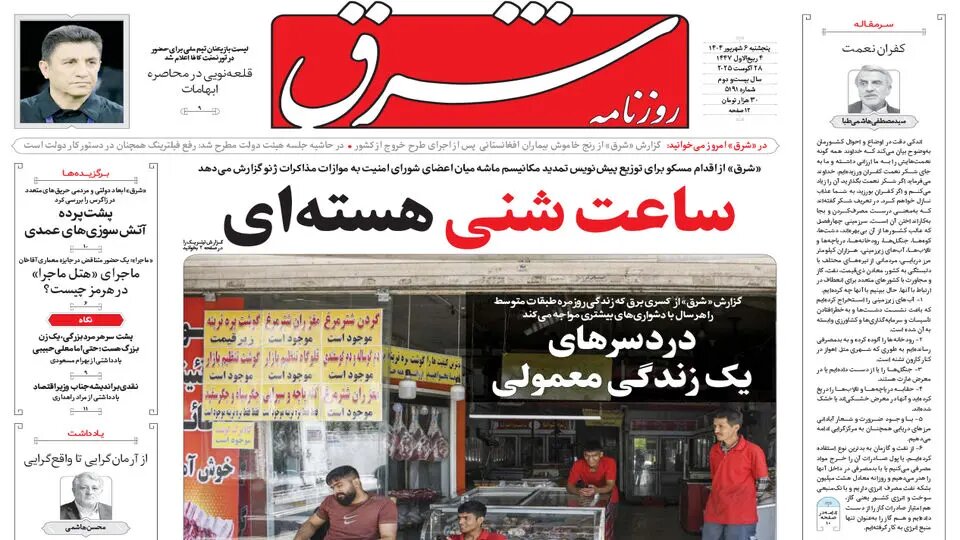Fateful circumstances

TEHRAN - In a note, Shargh discussed the European troika’s activation of the snapback mechanism against Iran.
It wrote: The European troika’s decision to send a letter to the Security Council and initiate the snapback mechanism process has once again put Iran’s nuclear issue at the center of global politics. This action has not only revived long-standing tensions over the implementation of the JCPOA, but also exposed a complex equation of global powers’ interactions with Iran. France, Germany, and Britain are pursuing the process of returning UN sanctions under the claim that Iran has violate its nuclear commitments. At the same time, Iran’s mission to the UN has described the current moment as fateful and considers it a test of Europe’s alleged claim of sincerity in supporting diplomacy. The United States has openly supported the Europeans’ action and sees it in line with its previous pressures. Washington seeks to frame this measure as an effort to weaken Iran’s nuclear deterrence. However, recent developments—from the joint Israeli-U.S. strikes on Iran two months ago to Tehran’s subsequent responses—demonstrate that the JCPOA crisis extends beyond a mere legal disagreement. It is increasingly manifesting within a broader security and geopolitical framework.
Farhikhtegan: Snapback gambling and Iran's options ahead
In a commentary, Farhikhtegan wrote: We observed that despite indirect negotiation between Iran and the United States, the American side entered the war in support of the Zionist regime and targeted Iran's nuclear infrastructure. Given this experience, any political action against Iran's nuclear program will be considered a prelude to escalating tensions. Withdrawing from the NPT is just one of the steps that Iran has threatened to take if the snapback mechanism is invoked. In addition to restraining the International Atomic Energy Agency (IAEA) from excessive monitoring activities, Iran could significantly increase its enrichment capacity by installing more advanced centrifuges. Focusing on the design and construction of new-generation centrifuges or launching uranium metal production chains are other strategic steps that could further strengthen Iran’s technical position. Iran could also exploit its vast stockpile of enriched uranium for non-prohibited military applications, applications of which the Western parties and the Agency are well aware.
Hamshahri: The missile power of the Islamic Republic
In an analysis, Hamshahri discussed Iran's missile power and technology. It wrote: The defense and deterrence power of the Islamic Republic of Iran has been formed based on a set of key components. One of the most important components of this power is missile capability. Iran is among the advanced and prominent countries in the world in missile technology. This strategic capability was well demonstrated, especially during the 12-day sacred defense in June. It proved its effectiveness. The Islamic Republic of Iran has demonstrated its significant power in missile technology as it possesses a variety of missiles with different ranges and capabilities. Achieving this level of missile power is the result of years of continuous effort despite complex security conditions and external pressure. It has now entered a new and more advanced stage. Over 90 percent of equipment needed by the armed forces is produced within the country, especially in the field of missile technology. Both solid-fuel and liquid-fuel missiles are 100% domestically manufactured, and we have no reliance on foreign countries.
Iran: Opportunity to cooperate with BRICS
Iran's membership in BRICS can be considered one of the most important foreign policy achievements of Iran in recent years. This action not only provides a new opportunity for Iran to play a role in the new multilateral structure in the world, but also provides a platform for expanding institutionalized cooperation with the "Global South." In the years since its formation, the bloc’s most important role has centered on global economy. Iran's official membership in BRICS coupled with structural transformation in the economic bloc, an important opportunity has been provided to improve Iran's position in the new international order. By deepening cooperation in the form of development-oriented programs at the 2025 summit, especially in the areas of finance, technology, energy, and global governance, BRICS will play a more effective role in regulating the multipolar architecture. Therefore, the necessity of utilizing the capacities of this institution for Iran is felt more than ever before. In this framework and based on the decision of the BRICS summit, Iran's role in this group is very valuable. (The 17th BRICS summit was held Rio de Janeiro, Brazil, on July 6-7. The summit was held under the theme “Strengthening Global South Cooperation and Promoting a More Inclusive and Sustainable Global Governance”.)
